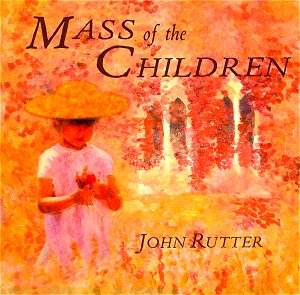I
like John Rutter’s music; there, I’ve said it. Only on MusicWeb
can you read such shocking revelations. He’s an easy target,
and one I refuse to shoot at, because, having performed and conducted
his music, I know what his aims are and how successful he is in
consistently achieving them; of how many living composers can
one say that? Yes, his music is sometimes too smooth and too pretty
for its own good. But many, many choristers will testify to how
much they have enjoyed singing the music, and what an impact it
has had upon their audiences. On the other hand, it can be argued
that this music is really not best heard on a recording. A CD
entirely of Rutter can leave you feeling as if you’ve just scoffed
a whole box of chocolates at one go – i.e. very queasy and with
a slightly guilty conscience.
The
"Mass of the Children" is his latest large-scale offering
to set alongside such works as the ‘Lichfield Canticle’ and the
‘Requiem’, and it arose from the composer’s desire to write something
that would allow adult and youth choirs to work together. He’s
hardly the first to do this, of course – it’s a trend that goes
back well beyond Gustav Mahler – but choral societies will welcome
the opportunities it presents.
However,
I did find the Mass harder to enjoy than some of his earlier works;
since the Requiem, Rutter has tended to give voice to the
sweeter, more tranquil side of his nature, eschewing drama or
tension. Yes, he can still write a charming melody, and he deploys
his forces with total professionalism. But there is a lack of
real emotional contrast – negative feelings tend to be hinted
at, dark shadows that momentarily pass across the music but never
assert themselves strongly. It’s never long before the prevailing
calm is re-established.
So
there is a little disappointment, though Rutter ‘groupies’ will
certainly find heaps to enjoy. The Missa brevis text (i.e without
Credo) is interleaved with settings in English, such as
the morning and evening prayers from Bishop Thomas Ken's hymns
for Winchester College, William Blake’s ‘The Lamb’, and so forth.
This last will probably polarise listeners into admirers and detractors
of the Rutter style; the former will find it spontaneous, one
of those melodies that immediately sounds as if it has always
existed; the latter will find it trite, predictable and sickly!
The
sequence of anthems that follow tends to confirm the negative
view, and it isn’t until we get to the final track, ‘Come down,
O Love divine’ of 1998, that the rather more contemporary, not
to say experimental, side of Rutter is heard. Written for the
Musicians’ Benevolent Fund’s annual St.Cecilia’s Day service,
the composer describes it as "..a piece which, I think, speaks
with a different voice from any of my others". I would agree;
it makes a welcome contrast, and I personally think it was a mistake
to stow it away right at the end of the CD. It’s certainly worth
hearing.
The
performances are highly accomplished. As usual, Rutter has chosen
soloists with fresh young voices, and the same goes for the excellent
Cambridge Singers – though the blend of voices in the altos is
less convincing than in the past. Michael Kibblewhite’s Cantate
Youth Choir sing with a bright and open tone that brings the music
vividly to life, and makes a refreshing change from the more commonly
heard cathedral style of singing. The recording is as good as
we’ve come to expect from Collegium, though it does sound very
studio-based and squeaky-clean. There is one clumsy piece of editing,
too, that makes poor Roderick Williams appear to stammer in his
very first entry – "C- Christe eleison".
Nevertheless,
a splendid issue of its kind, though the chocolate-box image is
rather strengthened by the packaging; the insert reminded me of
one of those nasty cheap greetings cards you see inscribed with
something along the lines of ‘Love is….’. Not nice at all! Don’t
be put off – there is some very fine music-making here.
Gwyn
Parry-Jones
